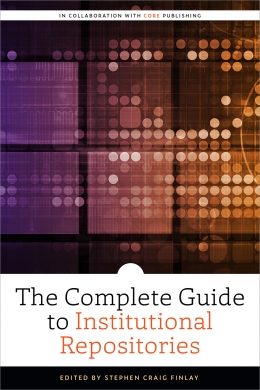Primary tabs
You don't need to be an ALA Member to purchase from the ALA Store, but you'll be asked to create an online account/profile during the checkout to proceed. This Web Account is for both Members and non-Members.
If you are Tax-Exempt, please verify that your account is currently set up as exempt before placing your order, as our new fulfillment center will need current documentation. Learn how to verify here.
- Description
- Table of Contents
- About the authors
- Reviews
This authoritative text will be a trusted reference for library directors implementing new IR programs or overseeing a maturing program, current professionals who find themselves with added IR responsibilities, and new librarians entering the job market.
The Institutional Repository (IR) has become standard to the academic library in the past decade. In fact, some 5,000 are listed in open access directories. However, IR operations are anything but standard. You are not alone in your challenges, whether it’s discovery of born-digital content or policies for deposit and withdrawal. This resource gathers expertise to offer a comprehensive guide on contemporary institutional repository management. Readers will sharpen their understanding of such key IR topics as
- managing complexity task-by-task using a detailed breakdown of IR projects;
- six crucial elements every deposit policy should address;
- using the SHERPA RoMEO database to quickly locate publisher policies;
- policy development, community outreach, and open source software testing, illuminated through case studies;
- metadata basics for the non-cataloger;
- authority control for electronic theses, dissertations, and grey literature;
- workflow suggestions for small and mid-sized institutions;
- showcasing undergraduates’ work with student peer-reviewed journals, photography, or theater performances;
- promoting faculty engagement with awards and recognition; and
- copyright fundamentals all staff who interact with the IR should know.
Part I Planning and Implementation
Chapter 1 Starting an Institutional Repository
Leo Stezano
Chapter 2 Communicating Value and Building Relationships
Harrison Inefuku
Chapter 3 Integrating Publishers’ Policies and Institutional Repository Workflows
Ian Harmon and Mariya Maistrovskaya
Chapter 4 The Deposit Policy: Balancing Content Goals and Ingest Control
David B. Lowe and Charity K. M. Stokes
Chapter 5 Name Authority Control in Repositories
Charity K. M. Stokes and David B. Lowe
Chapter 6 Identifying Policy Trends in Institutional Repositories
Christy Shorey and Erin Jerome
Chapter 7 Undergraduate Student Work in the Institutional Repository
Stephanie Davis-Kahl
Chapter 8 Staffing and Workflow for Institutional Repositories
Stephen Craig Finlay
Chapter 9 Creating Metadata for Institutional Repositories
Scott Opasik
Chapter 10 Copyright and Institutional Repositories
Benjamin Keele
Part II Case Studies
Chapter 11 Crafting an Institutional Repository Policy
Rebekah Kati
Chapter 12 Creating and Implementing a Successful Open-Access Policy
David Ball
Chapter 13 Testing Open-Source Institutional Repository Software
Amy Leigh Allen
Chapter 14 A Digital Project as Community Outreach: A New Way of Approaching Metadata
Patricia M. Dragon, Amanda Vinogradov, and Heather M. White
Chapter 15 Faculty Outreach with the Content Liberation Project
Jennifer Solomon and Rebekah Kati
About the Contributors
Index
Stephen Craig Finlay
Stephen Craig Finlay is the director of the library at Murray State College in Tishomingo, Oklahoma. Prior to this, he was the scholarly communication librarian at Indiana University South Bend, where he also taught information literacy. Finlay launched IU South Bend’s institutional repository and online journal publishing initiatives, and also started the first funded open educational resources program in the Indiana University system. In 2014 he founded the Michiana (now ALI) Scholarly Communication Librarianship Conference, which, as of 2020, is still going strong as the only annual conference on scholarly communication librarianship. Finlay has published on a wide range of issues including bibliometrics, disciplinarity, scholarly communication education, and doctoral research in library and information science.
Core
The former Association for Library Collections and Technical Services (ALCTS), the Library Information Technology Association (LITA), and the Library Leadership and Management Association (LLAMA) are now Core: Leadership, Infrastructure, Futures, a new division of ALA. Its mission is to cultivate and amplify the collective expertise of library workers in core functions through community building, advocacy, and learning.
"[Finlay] has assembled a respected cadre of authors ... [This book] does a fine job of addressing key IR concepts and providing straightforward, real-world, successful examples of how IR provides a venue for an institution’s scholarly publication both locally and globally.”
— Technicalities
"Written for those new to the field and those seeking to understand institutional repositories better, this book provides the background needed for librarians new to the discipline to begin to understand the complexities of digital scholarship and institutional repositories. It also has enough variety to expand the knowledge of those who already have some experience in this discipline.”
— Technical Services Quarterly



